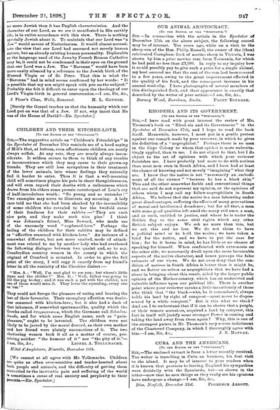RHODESIA. AND ITS GOVERNMENT.
[To TIM EDITOR Or THE *SPECTATOR:] Sin,—I have read with great interest the review of Mr. Thomson's book on "Rhodesia and its Government" in the Spectator of December 17th, and I hope to read the book itself. Meanwhile, however, I must put in a gentle protest against one remark made by your reviewer, in which he gives his definition of a "negrophilist." Perhaps there is no man in the Cape Colony to whom that epithet is more unhesita- tingly applied, than to me. I do not object to that, but I do object to the set of opinions with which your reviewer furnishes me. I have probably had more to do with natives than most men even in South Africa, and I have bad at least the chance of knowing and not merely "imagining" what they are. I know that the native is not "necessarily an embodi- ment of all the virtues " "because he has a black skin." This and the other somewhat feeble and conventional things that are said do not represent my opinion, or the opinions of others whom I may call my fellow-negrophilists in South Africa. We believe that the native is a man labouring under great disadvantages, suffering the effects of many generations of moral and intellectual decadence; but for all that, a man with some good qualities left amid the many evil ones, a man, and as such, entitled to justice, and where he is under the British flag to the same civil rights which any other Briti.h subject enjoys. We ask no more than this, but we ask this and no less. We do not claim to have a judicial mind or to hold the scales ; we have taken a brief for the native, and we have to put the case for him ; for be it borne in mind, he has little or no chance of speaking for himself. When confronted with extremists on the other side, we necessarily dwell upon the more favourable aspects of the native character, and hence perhaps the false estimate of our views. We do not even deny that the con- dition of natives in South Africa is better than it might be, and we flatter ourselves as negrophiliets that we have had a share in bringing about this result, aided by the larger publics opinion of the Mother-country, which has an undoubted and valuable influence upon our political life. There is another point where your reviewer speaks a little incautiously of those who think that "the black—who, be it remembered, always holds his land by right of conquest—must never be dispos- sessed by a white conquest." But is this what we think P And am I to understand that if it can be shown that a people, or their remote ancestors, acquired a land by conquest, this fact in itself will justify some stronger Power in coming and taking the land away from them again P Why, this is one of the strongest points in Mr. Thomson's very severe indictment of the Chartered Company, in which I thoroughly agree with






































 Previous page
Previous page